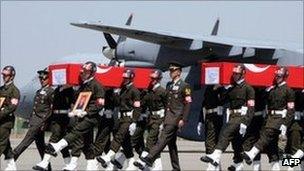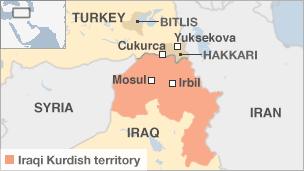Mistrust at the centre of Turkey's Kurdish strife
- Published

The PKK has proved it is capable of inflicting heavy losses on the Turkish military
These were well-planned attacks, carried out simultaneously a little after midnight, on military and police posts close to the border with Iraq.
About 100 fighters from the Kurdistan Workers' Party (PKK) took part, some crossing the border from Iraq, some moving from inside Turkey.
The toll - of 24 dead and 18 injured - is the largest suffered by the Turkish security forces since 1993.
The response by the Turkish military has been a predictable one: more raids by jets and helicopters on targets inside Iraq, with ground forces moving around 8km (five miles) across the Iraqi border.
The military says it killed 15 of the PKK insurgents; it claims to have killed as many as 160 in air raids carried out since July.
Failed peace initiative
The PKK has proved before that it is capable of such an attack, and of inflicting heavy losses.
In June last year, it carried out a very similar night-time raid, using large numbers of fighters, and killed 13 soldiers stationed at a remote outpost along the border.
The government vowed then that the soldiers would be better protected, and questions were posed about the suitability of a young, conscript army for tackling an entrenched insurgency.
If lessons were learned, they do not appear to have helped those battling the PKK in the latest attacks.
Bigger questions hang over why the PKK has escalated its operations against the military over the past four months, and why the Turkish government, which repeatedly says it wants to pursue reconciliation, has been unable to stop the harsh treatment of Kurdish nationalist figures by the judiciary.
Time and again, apparent windows for peace have been shut down abruptly.
In October 2009, following Prime Minister Recep Tayyip Erdogan's unprecedented offer of a new beginning for relations between Turkey's largest minority and the state, 34 Kurdish activists, including eight PKK fighters, crossed the border from Iraq, and turned themselves over to the Turkish authorities.
It was presented as a gesture, a test of the government's intentions. The activists were allowed to go free, instead of being prosecuted.
But then it all went wrong.
A jubilant welcome for the activists by tens of thousands of Kurds, waving PKK symbols, provoked a strong nationalist reaction in a Turkish public conditioned to think of the PKK only as an evil, terrorist organisation.
The government had rushed into a badly thought-out peace initiative, without preparing the Turkish people for it.
Vacuum filled
By the end of 2009, the main Kurdish party had been banned - for the seventh time - by the constitutional court, and dozens of Kurdish community leaders were being prosecuted under the draconian, catch-all anti-terror laws.

One Kurdish editor was sentenced to 166 years in prison, merely for the pro-PKK sentiments published in his newspaper.
It was a similar situation after the general election in June this year, in which Kurdish candidates did well.
This opened the possibility of Kurds pressing their demands through parliament, and working with the government on a new constitution - one of their central demands.
But a court decision to strip one Kurdish MP of his seat, and give it to the ruling AK party, poisoned the atmosphere.
Kurdish MPs boycotted parliament, and announced what they called their own "democratic autonomy" initiative, taking greater control of local government.
There has never been a constructive dialogue between the AK, Turkey's most successful democratic party, and Kurdish leaders.
They just seem to talk, or shout, past each other, even though both have acknowledged that the use of military force by both sides has brought about nothing but hatred and the loss of more than 40,000 lives.
This despite the fact that the AK is the first party to attempt to address the grievances of the Kurds, and has managed to ease some of the restrictions on Kurdish expressions of identity.
The terrible atrocities committed against Kurdish communities in the 1990s have left a searing anger towards the Turkish state, compounded by the poverty, unemployment and ill-treatment that blight the Kurdish south-east.
But such is the engrained hostility of millions of Turks towards the Kurdish nationalist movement, that any attempt to negotiate with it could cost a government significant numbers of votes.
The lack of leadership on the Kurdish issue has left a vacuum, now filled by the armed hardliners of the PKK.
It is hard to interpret its decision to increase its attacks on the army and police as anything else but an attempt to sabotage any future peace initiative, should it ever get off the ground.
In the current, bitter climate of mutual recriminations, that is unlikely to happen.
- Published19 October 2011
- Published18 October 2011
- Published17 August 2011